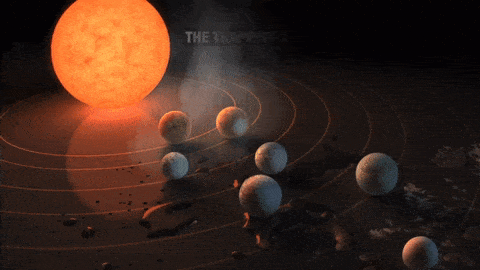
Foundations Of Astronomy
Quiz
•
Science
•
8th - 12th Grade
•
Hard
+1
Standards-aligned

Clint Sandford
Used 1K+ times
FREE Resource
20 questions
Show all answers
1.
MULTIPLE CHOICE QUESTION
30 sec • 1 pt

From the choices presented - which is the largest object or structure in space?
Earth
The Sun
The Solar System
The asteroid belt
Tags
NGSS.MS-ESS1-3
2.
MULTIPLE CHOICE QUESTION
30 sec • 1 pt

Which object or structure is the smallest?
Earth
Mars
Jupiter
The Solar System
Tags
NGSS.MS-ESS1-3
3.
MULTIPLE CHOICE QUESTION
30 sec • 1 pt

The largest single object in the solar system is ______.
Saturn
Jupiter
Earth
The Sun
Tags
NGSS.MS-ESS1-3
4.
MULTIPLE CHOICE QUESTION
45 sec • 1 pt

The largest structure in the entire Universe is the
Universe itself.
Orion Nebula.
Milky Way Galaxy.
Virgo Supercluster.
5.
MULTIPLE SELECT QUESTION
1 min • 1 pt

What is a "light year?"
a distance of about 6 trillion miles (9.8 trillion km)
the distance traveled by the speed of light in 1 year
the time traveled by the speed of light in 1 year
a distance of about 6 billion miles (9.8 billion km)
Tags
NGSS.MS-ESS1-3
6.
MULTIPLE SELECT QUESTION
1 min • 1 pt

Why do astronomers use light years as a measurement?
because miles & kilometers are sufficient
it's an easier way to describe huge distances
it's an easier way to describe large objects such as stars
because distances in space are extremely vast
Tags
NGSS.MS-ESS1-3
7.
MULTIPLE CHOICE QUESTION
30 sec • 1 pt

The Milky Way galaxy is approximately _____ thousand light years in diameter.
1000
10
100
1
Tags
NGSS.MS-ESS1-3
Create a free account and access millions of resources
Similar Resources on Wayground

20 questions
Constellations
Quiz
•
11th - 12th Grade

15 questions
Constellations
Quiz
•
5th Grade - University

20 questions
Unit 1 Quiz
Quiz
•
10th - 12th Grade

17 questions
Astronomy Unit 3 Test Review
Quiz
•
12th Grade

21 questions
Galaxies & Constellations
Quiz
•
6th - 8th Grade

15 questions
Regents Earth Science Review
Quiz
•
10th Grade - University

15 questions
Sun, Stars
Quiz
•
5th Grade - University

15 questions
Constellation
Quiz
•
12th Grade - University
Popular Resources on Wayground

10 questions
Video Games
Quiz
•
6th - 12th Grade

10 questions
Lab Safety Procedures and Guidelines
Interactive video
•
6th - 10th Grade

25 questions
Multiplication Facts
Quiz
•
5th Grade

10 questions
UPDATED FOREST Kindness 9-22
Lesson
•
9th - 12th Grade

22 questions
Adding Integers
Quiz
•
6th Grade

15 questions
Subtracting Integers
Quiz
•
7th Grade

20 questions
US Constitution Quiz
Quiz
•
11th Grade

10 questions
Exploring Digital Citizenship Essentials
Interactive video
•
6th - 10th Grade
Discover more resources for Science

20 questions
Scientific method and variables
Quiz
•
8th Grade

20 questions
Physical and Chemical Changes
Quiz
•
8th Grade

16 questions
Metric Conversions
Quiz
•
11th Grade

10 questions
Exploring the Scientific Method
Interactive video
•
6th - 10th Grade

20 questions
Microscopes
Quiz
•
7th - 8th Grade

10 questions
Law of Conservation of Mass
Quiz
•
8th Grade

10 questions
Exploring Chemical and Physical Changes
Interactive video
•
6th - 10th Grade

17 questions
Enzymes
Quiz
•
9th Grade



